

| Administrator Guide > Workflows > Automated Workflow |
Automated Workflows are used to automatically execute a workflow on accounts or cases that meet specified criteria. Administrators can select workflows to be automated and executed daily during the morning batch process, or executed on a schedule defined by the financial institution. Automated workflows are managed in the System Management > Workflows > Automated Workflow page.
There are three tabs displayed within this page: Automated Workflows, Execution Order, and Execute Workflows.
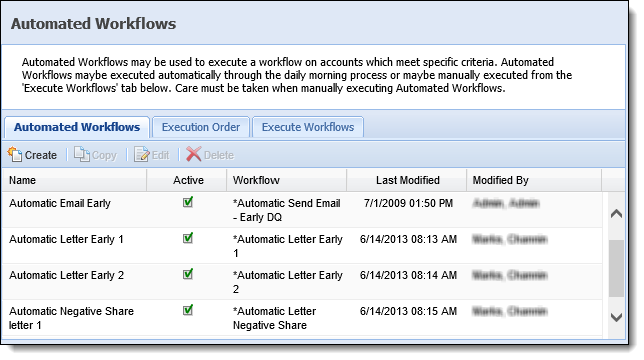
 |
Only workflows that have automated steps can be used in automated workflows. If a manual step is included in an automated workflow, the workflow is “suspended” and is marked as Active on the Workflow History screen in the workspace. |
For a list of workflow steps that are automated, please see the Workflow Steps section of the End User Guide.
All automated workflows within Temenos Infinity are managed from the Automated Workflows tab. This tab is displayed by default when opening the Automated Workflows page in System Management.
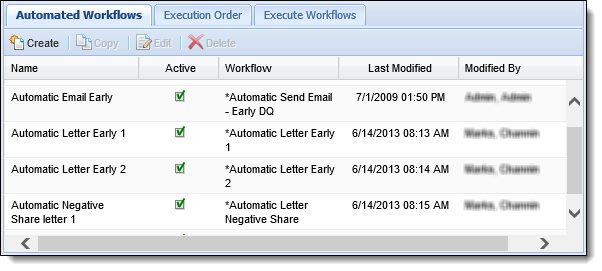
The following columns display within the Automated Workflows tab:
| Column Name | Description |
| Name | Displays the name of the automated workflow. |
| Active | Displays a  if the automated workflow is active. if the automated workflow is active. |
| Workflow | Displays the name of the workflow that is run as a part of the automated workflow. |
| Last Modified | Denotes when the last modification was made. |
| Modified By | Denotes who made the last modification. |
All automated workflows share common attributes that are defined while creating, copying, or editing an automated workflow.
General attributes provide administrators with the ability to define the basic information pertaining to automated workflows.
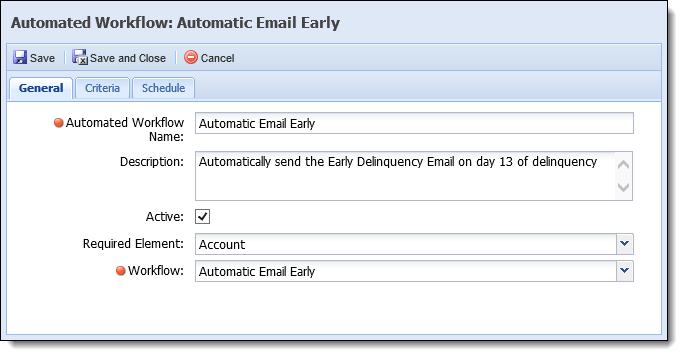
The following attributes are located on the General tab:
| Attribute | Description |
| Automated Workflow Name | Enter a name for the automated workflow. This field is required. |
| Description | If desired, enter additional details about the automated workflow. |
| Active | Select this check box to activate the automated workflow. |
| Required Element | From the drop-down, select the level in which the automated workflow runs (Account or Case). |
| Workflow | From the drop-down, select the workflow to run as a part of the automated workflow. |
Criteria attributes provide administrators with the ability to determine on which accounts and persons the automated workflow runs by using the standard criteria builder.
 |
For more information on the criteria builder, please see the Criteria Builder Help topic in this guide. |
 |
Primary fields, not Person fields, are available when setting the criteria for an automated workflow. |
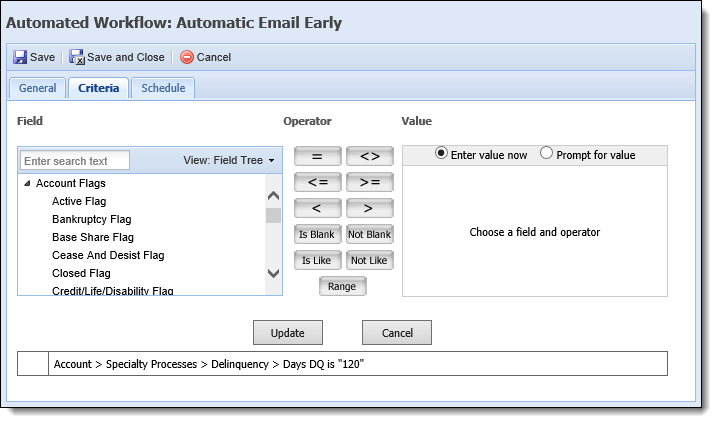
Schedule attributes provide administrators with the ability to define when an automated workflow runs.
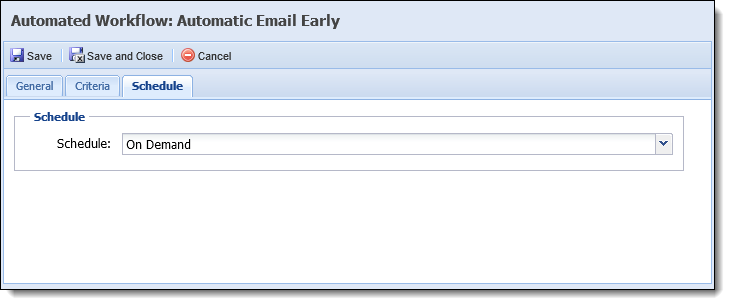
Select one of the following runtime options from the Schedule drop-down:
| Schedule Option | Description | ||
| On Demand | Select On Demand to manually run the automated workflow by clicking  on the Execute Workflows tab. on the Execute Workflows tab. |
||
| Daily |
Select Daily for the workflow to run automatically each day without user intervention. When Daily is selected, a Time drop-down appears to select the specific run time.
|
||
| Weekly |
Select Weekly for the workflow to run once a week without user intervention. When Weekly is selected, check boxes for each day of the week appear to allow the administrator to select the specific run day. The Time drop-down also appears to select the specific run time.
|
||
| Monthly |
Select Monthly for the workflow to run once a month without user intervention. When Monthly is selected, a Date of Month drop-down appears to select the specific day of the month that the workflow is to be run. The Time drop-down also appears to select the specific run time.
|
Automated workflows can be configured as a part of a multi-account workflow or a single-account workflow. When ran as a single-account versus a multi-account workflow, different results are produced. A good example of this is incorporating a send letter or send email workflow step as a part of an automated workflow.
Administrators can set the order in which automated workflows are executed within the Execution Order tab. This feature is useful if an account meets criteria for multiple workflows. A higher workflow in the list on the Execution Order tab takes precedence over a workflow that is lower in the list.
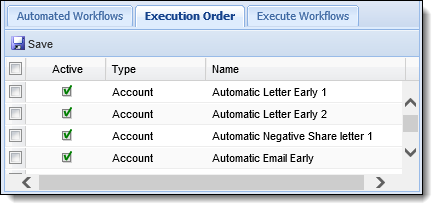
The following columns display within the Execution Order tab:
| Column Name | Description |
| Active | Displays a  if the automated workflow is active. if the automated workflow is active. |
| Type | Displays the level in which the automated workflow runs (Account or Case). |
| Name | Displays the name of the automated workflow. |
Administrators can manually execute automated workflows outside of the normal daily processing the defined runtime schedule through the Execute Workflows tab.
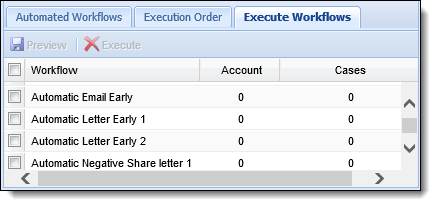
The following columns display on the Execute Workflows tab:
| Column Name | Description |
| Workflow | Displays the name of the automated workflow. |
| Account | Displays the number of accounts that were affected by the Preview or Execute functions. |
| Cases | Displays the number of cases that were affected by the Preview or Execute functions. |
From the Execute Workflows tab, administrators can manually Preview and Execute automated workflows.
Previewing an automated workflow provides an administrator with the ability to assess the number of accounts or cases that would be affected if the automated workflow was executed at this point in time.